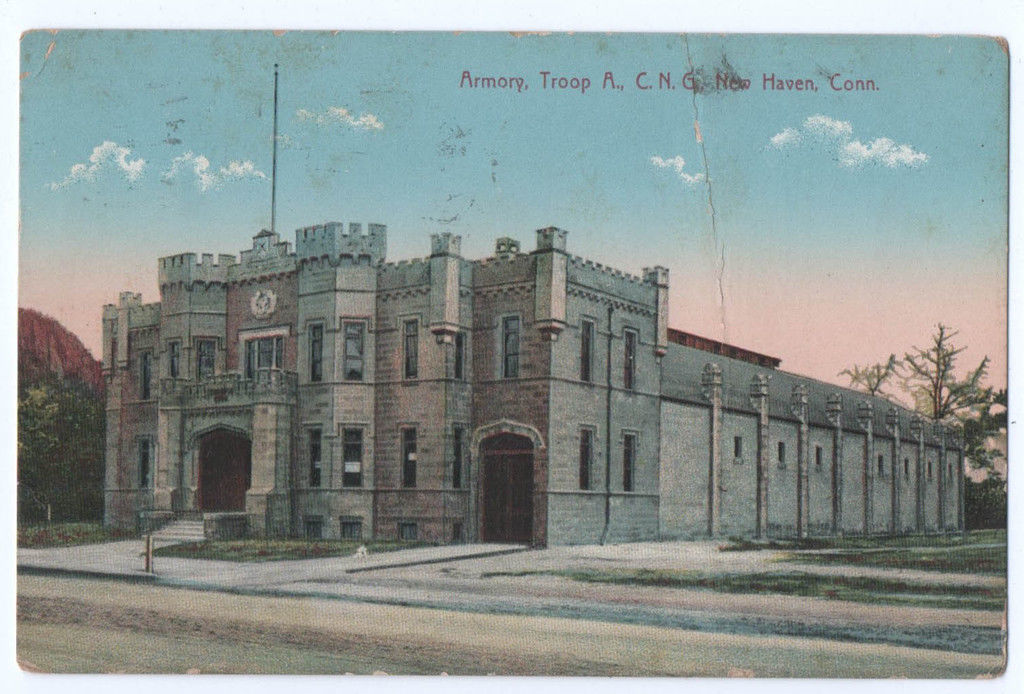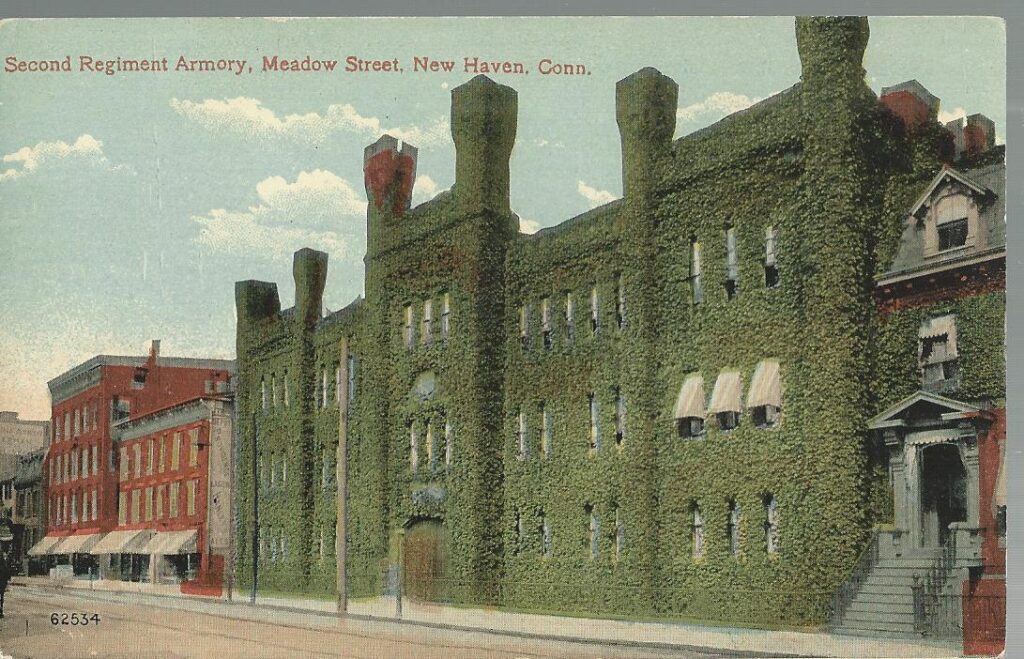The following article appeared in the Centennial Newsletter on February 24th, 2025.
A Century of Involvement with Community: Albertus Magnus College and the New Haven Armory
Five years after Albertus Magnus College welcomed its first students in 1925, a massive structure was completed on Goffe Street, one of three main roads that originate at Broadway (Yale Book Store) and lead to other parts of New Haven. The State Armory building was completed in 1930 under the administration of Governor John H. Trumbull. Unlike Albertus Magnus College, whose centennial celebration is this year, the Armory has gone through several iterations in its ninety-five year history, and has been unoccupied for the last fifteen years.
Shortly after the State Armory was completed, it became home for the New Haven Grays Unit (102nd Infantry), and the 2nd Company of the Governor’s Foot Guard. Although it was built as a military facility, the Armory served other purposes, as well. In 1931, it was the site of the inauguration of Governor Wilbur L. Cross, who would serve as Connecticut’s governor until 1939. Connecticut’s tercentenary Ball was held in the Armory in 1935.
Over the years, the State Armory has been enmeshed with the history of New Haven. In 1970, the National Guard was mobilized to respond to the New Haven Black Panther Trials. The Armory became its staging ground for the May Day rally, a gathering that offered the potential for bloodshed. The National Guard even set up provisional troops along Prospect Street, outside of Albertus, in case the demonstrations got out of hand. Disaster was avoided as a result of cooperative efforts between Yale University and New Haven, between local and national activists, and between black and white equal rights advocates. Also during the seventies, the Armory was the site of the New England Black Expo sponsored by the Black Coalition of Greater New Haven. For its significant role in the Civil Rights Movement and its recognition of Black history, the Connecticut State Armory was named the 21st site on the Connecticut Freedom Trail. The State Historic Preservation Office and the Amistad Committee, Inc., of New Haven are administrators of the Connecticut Freedom Trail.
In keeping with its tradition of reaching out to the community, the Armory became a temporary homeless shelter in 1986, and in 2005, when New Haven responded to the needs of Hurricane Katrina, the Armory became a donation center. In 2009, when the Governor’s Footguard left the Armory, the State of Connecticut transferred ownership to the City of New Haven. Subsequently, during the years between 2014 and 2017, the Armory became the site of Artspace Open Studios and the Armory Community Garden.
Recently, the Goffe Street Armory attracted public attention when the City of New Haven, current owner of the building, announced it is accepting ideas for making the building functional again. Several advocates for preserving the Armory, including at least one faculty member of the Yale School of Architecture, point out its historical value, as well as its possibilities for housing a much needed trade school in the city, and for use of its military drill halls to accommodate large community meetings and gatherings. During the last few years, one group in the Armory’s neighborhood has begun a community garden along the building’s east side. This endeavor has resulted in a community that shares the work involved with gardening, and also with managing the produce at harvest time. Those who have been energized by their cooperative efforts in gardening, have joined the current redevelopment movement for preservation of the Armory.
It is worth noting that Albertus Magnus College and the Armory, both founded in New Haven in the 1920s, have utilized the joy of gardening as an effective means of reaching out to residents of their respective communities. Albertus Magnus College has a community garden on campus located between Siena and Sansbury Hall. The Community Garden is a site for experiential learning and community-building. As of 2023, Albertus has donated over a thousand pounds of produce in response to growing food insecurity in the New Haven community.
“Community” is one of the four foundational pillars of Albertus Magnus College. New Haven has established the Armory Community Advisory Committee as a means of community outreach. Both see “community” as foundational, and continue to sustain their community gardens, and to develop community activities and relationships that go beyond gardening to address their communities’ current needs. Moreover, since their beginnings a century ago, Albertus Magnus College and those entrusted with the New Haven Armory continue to be committed to preserving historically significant buildings with which they are entrusted. As they approach their second century, both continue to be key players in New Haven’s history and its sense of community.
Contributed by: Dr. Joan Venditto


